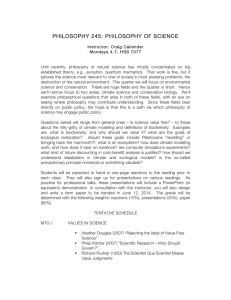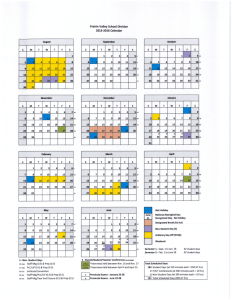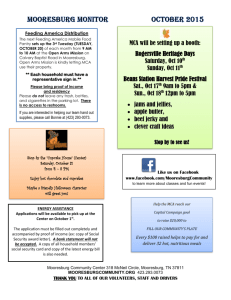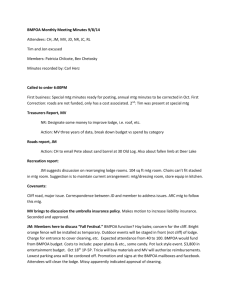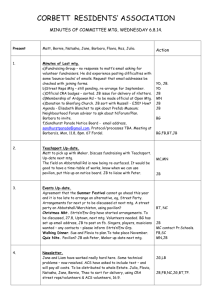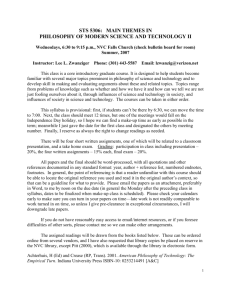Psych 1 General Psychology (Fall/Spring)
advertisement
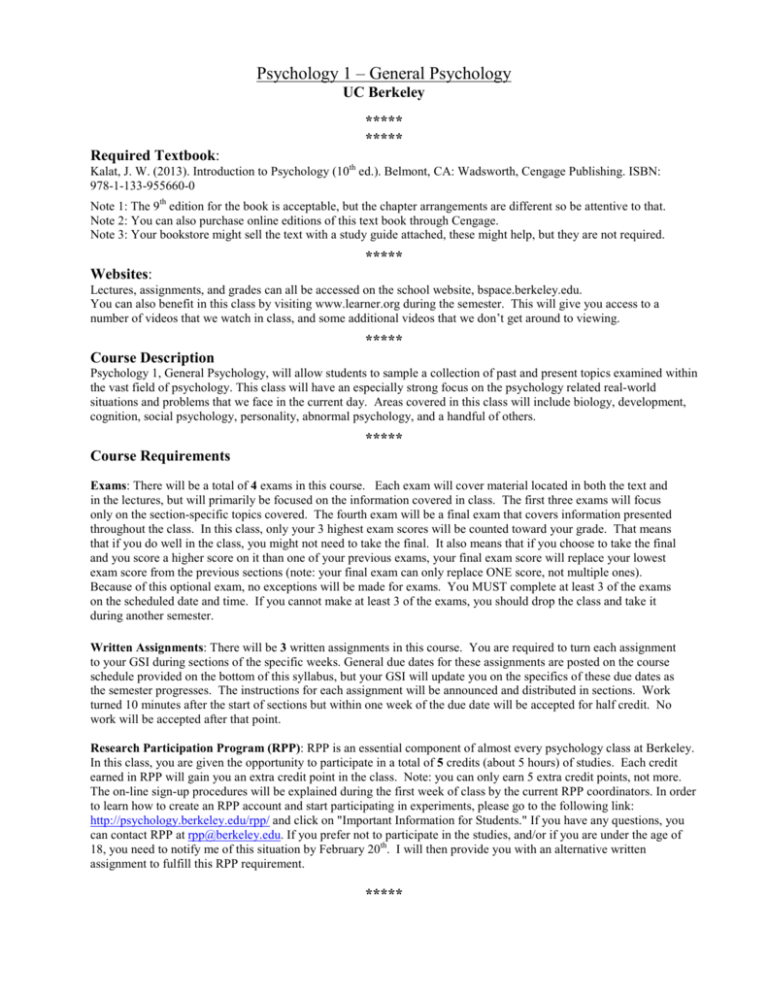
Psychology 1 – General Psychology UC Berkeley ***** ***** Required Textbook: Kalat, J. W. (2013). Introduction to Psychology (10th ed.). Belmont, CA: Wadsworth, Cengage Publishing. ISBN: 978-1-133-955660-0 Note 1: The 9th edition for the book is acceptable, but the chapter arrangements are different so be attentive to that. Note 2: You can also purchase online editions of this text book through Cengage. Note 3: Your bookstore might sell the text with a study guide attached, these might help, but they are not required. ***** Websites: Lectures, assignments, and grades can all be accessed on the school website, bspace.berkeley.edu. You can also benefit in this class by visiting www.learner.org during the semester. This will give you access to a number of videos that we watch in class, and some additional videos that we don’t get around to viewing. ***** Course Description Psychology 1, General Psychology, will allow students to sample a collection of past and present topics examined within the vast field of psychology. This class will have an especially strong focus on the psychology related real-world situations and problems that we face in the current day. Areas covered in this class will include biology, development, cognition, social psychology, personality, abnormal psychology, and a handful of others. ***** Course Requirements Exams: There will be a total of 4 exams in this course. Each exam will cover material located in both the text and in the lectures, but will primarily be focused on the information covered in class. The first three exams will focus only on the section-specific topics covered. The fourth exam will be a final exam that covers information presented throughout the class. In this class, only your 3 highest exam scores will be counted toward your grade. That means that if you do well in the class, you might not need to take the final. It also means that if you choose to take the final and you score a higher score on it than one of your previous exams, your final exam score will replace your lowest exam score from the previous sections (note: your final exam can only replace ONE score, not multiple ones). Because of this optional exam, no exceptions will be made for exams. You MUST complete at least 3 of the exams on the scheduled date and time. If you cannot make at least 3 of the exams, you should drop the class and take it during another semester. Written Assignments: There will be 3 written assignments in this course. You are required to turn each assignment to your GSI during sections of the specific weeks. General due dates for these assignments are posted on the course schedule provided on the bottom of this syllabus, but your GSI will update you on the specifics of these due dates as the semester progresses. The instructions for each assignment will be announced and distributed in sections. Work turned 10 minutes after the start of sections but within one week of the due date will be accepted for half credit. No work will be accepted after that point. Research Participation Program (RPP): RPP is an essential component of almost every psychology class at Berkeley. In this class, you are given the opportunity to participate in a total of 5 credits (about 5 hours) of studies. Each credit earned in RPP will gain you an extra credit point in the class. Note: you can only earn 5 extra credit points, not more. The on-line sign-up procedures will be explained during the first week of class by the current RPP coordinators. In order to learn how to create an RPP account and start participating in experiments, please go to the following link: http://psychology.berkeley.edu/rpp/ and click on "Important Information for Students." If you have any questions, you can contact RPP at rpp@berkeley.edu. If you prefer not to participate in the studies, and/or if you are under the age of 18, you need to notify me of this situation by February 20th. I will then provide you with an alternative written assignment to fulfill this RPP requirement. ***** Grading Policy Final grades will be calculated on the basis of 255 points distributed as follows: Requirement Points % of grade Exam 1 60 23.53% of your grade Exam 2 60 23.53% of your grade Exam 3 60 23.53% of your grade (Final Exam) (60) (can replace up to 23.53% of your grade) Psychology in Life Paper 20 7.84% of your grade Behaviorism and Habits Paper 25 9.80% of your grade Popular Press vs Peer Reviewed Papers 30 11.76% of your grade RPP Bonus (5) (you can earn back 1.96% of your grade) Final grades will be based on a standard 100% scale: A=90%-100%, B=80%-90%, C=70%-80%, D=60%-70%, with + and – for the upper and lower 3% extremes of those ranges (e.g. B- = 80-82.9%, B = 83-86.9%, B+ = 87-89.9%). Please note, there is no rounding up in this class, your % is your %. ***** Student Responsibilities You will not be required to put in long nights of studying, or have the intellectual capacity of Einstein in order to be successful in this course. However, effort, vigilance, and a positive mindset will be essential for both success and an appreciation of the material that will be presented to you this semester. Listed below are some additional necessary and helpful tips about how to be successful and get the most out of this course. 1) Attend lectures and sections. Each class will almost always contain pieces of information about topics that are not located in the text. Therefore, it is imperative that you come to them and pay attention while you are there. These lectures are also intended to be fun… hopefully. 2) Arrive on time. If you’re late, it will be more difficult to comprehend the flow of information, you may miss an activity, and it’s just in bad taste to be late. 3) Read the chapter that pertains to each lecture in advance. You will learn more and be more prepared to respond to or ask questions if you do this. You will also benefit more from the in-class activities. Do not fall behind in the reading. 4) Be aware of exam dates and assignment due dates. Write them into your date book or calendar today. ***** Academic Honesty Both the University and your instructor take academic honesty very seriously. Anyone caught cheating on an exam or assignment will automatically fail the class. Their behavior will also be brought to the attention of the psychology department and University. Afterward, further actions might then be taken by both sources. ***** Disability Statement If you are a student who needs academic accommodations or support because of a documented disability, you should contact me and provide copies of your contract or accommodation letters as soon as possible so that appropriate arrangements can be made. All discussions will remain confidential. If you have questions about accessing Disability Support Services, documenting a disability, or requesting accommodations, you should contact the appropriate disability support program at your institution. ***** Course Schedule Date Topic Reading Section Topic/Required Reading/HW Due Mtg 1 Introduction/Syllabus/RPP None Introductions and Paper Discussion Mtg 2 Neuroscience (Neurons) Module 3.1 Drugs (Mod 3.2) Mtg 3 Neuroscience (The Brain) Module 3.3 Mtg 4 Neuroscience (Vision) Module 4.1 Mtg 5 Cognition (Perception) Module 4.3 Touch (Mod 4.2) Mtg 6 Cognition (Introducing Memory) Module 7.1 Mtg 7 Cognition (Memory Issues) Modules 7.2 & 7.3 Mtg 8 No Class (Academic Holiday) Mtg 9 Cognition (Intelligence) No Sections (Tue-Fri) No Sections Modules 9.1 Mtg 10 Exam 1 (Modules 3.1-3.3, 4.1-4.3, 7.1-7.3, 8.2, 9.1) Sleep (Mod 10.2) *Paper 1 Due in Section* Mtg 11 Development (Development Concepts) Module 5.1 Mtg 12 Development (Piaget) Mtg 13 Behaviorism (Classical Conditioning) Modules 6.1 Mtg 14 Behaviorism (Operant Conditioning) Module 6.2 Mtg 15 Social (Social Perception) Module 13.2 Mtg 16 Social (Influence) Module 13.5 Attraction (Mod 13.4) *Paper 2 Due In Mtg 17 Social (“Obedience”) None Sections* SPRING BREAK SPRING BREAK None No Sections Mtg 18 & 19 Mtg 20 Other Developmental Theories (Mod 5.2) SPRING BREAK Final Paper Behavior Modification (review Mods 6.1 and 6.2) SPRING BREAK Mtg 21 Exam 2 (Modules 5.1-5.2, 6.1-6.2, 10.2, 13.2, 13.4, 13.5) Mtg 22 Personality (Freud) Mtg 23 Personality (Other Theories) Mtg 24 Personality (Trait Theories) Mtg 25 Clinical (Abnormal Psychology) Module 14.1 Hypnosis (Mod 10.3) Module 14.2 Assessing Pers. (Mod 14.3) Module 15.1 Mtg 26 Clinical (Therapy) Substance Abuse (15.3) *Paper 3 Due In Mtg 27 Clinical (Anxiety & Mood Disorders) Modules 15.2 & 15.4 Sections* Mtg 28 Clinical (Mood Dis. & Schizophrenia) No Sections Mtg 29 Exam 3 (Modules 10.3, 14.1-14.3, 15.1-15.4) *RPP Ends* Mtg 30 toMtg31 READING WEEK READING WEEK Mtg 32 Final Exam (Chapter 3-10, 13-16) READING WEEK READING WEEK *Exam is at 11:30 AM, you MUST be on time* Disclaimer: This syllabus is subject to modification. The instructor will communicate with students on any changes.

